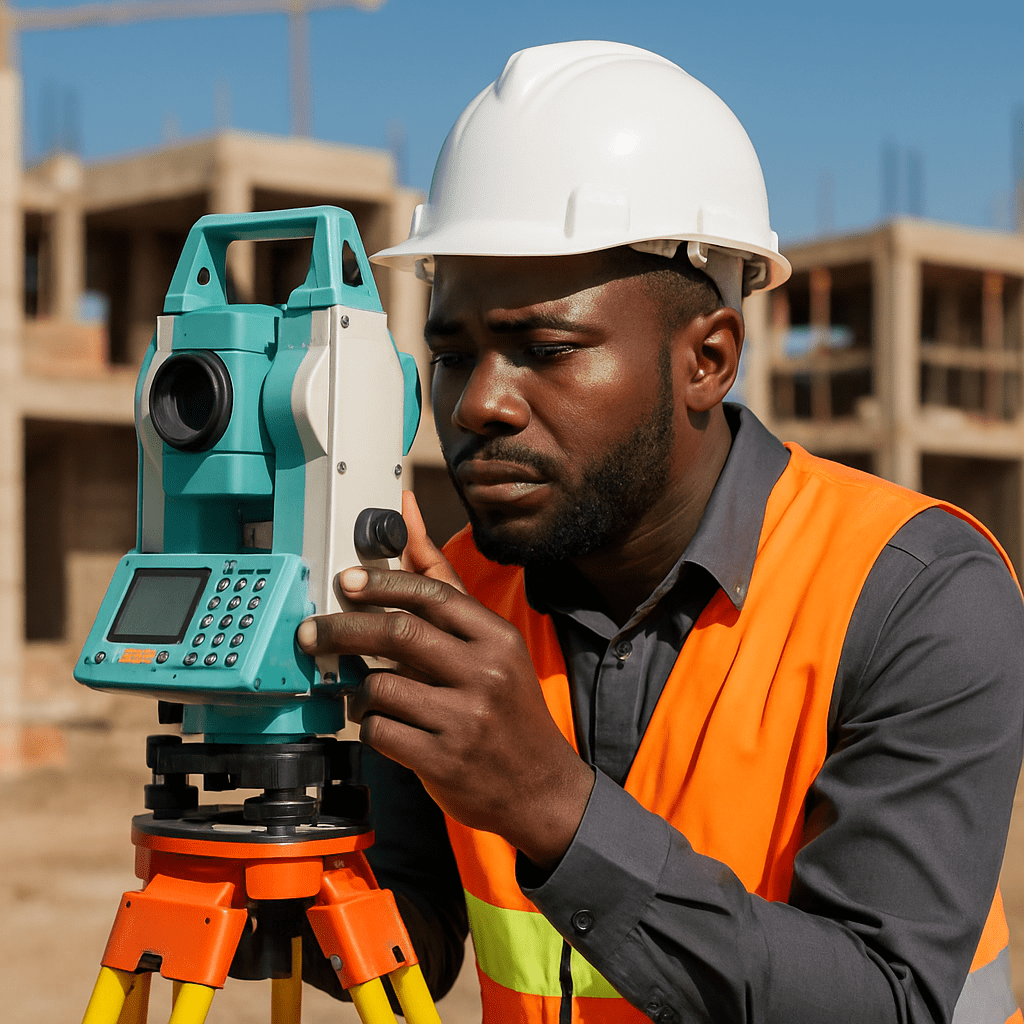
Whether you’re planning to build your dream home, invest in a commercial property, or subdivide land for development, one professional should never be overlooked: the land surveyor. At Conifer Konstruktion Nig. Ltd, we’ve seen firsthand how early engagement with a licensed land surveyor can make or break a project—especially in Nigeria, where property titles, boundaries, and terrain can be complex. That’s why we’ve made land surveying a non-negotiable part of our project workflow. But who exactly is a land surveyor? What do they do? And why is their role so vital to a stress-free building experience? This article walks you through everything you need to know. A land surveyor is a trained and licensed professional who measures and maps land to define legal boundaries, determine terrain features, and supply accurate data that guides design, approvals, and construction. From the moment land is acquired to when the building is completed, land surveyors provide the precise, legally grounded data needed to move forward with confidence. In Nigeria, surveyors are regulated by the Surveyors Council of Nigeria (SURCON) and often work closely with town planners, estate surveyors, architects, and civil engineers. The first duty of a land surveyor is to determine exactly where your property begins and ends. This is done by measuring and interpreting physical features, old survey plans, beacons, and legal property documents (known locally as “C of O,” “Deed of Assignment,” or “Registered Survey”). This helps to: Prevent disputes with neighbours Avoid encroaching on government land or right-of-way Ensure your land documents are accepted during title registration At Conifer Konstruktion, we’ve seen clients almost lose parts of their land due to improperly marked boundaries. That’s why we begin every project with a boundary survey. Before the surveyor goes to the field, they study the title documents and cross-check with records from the Surveyor General’s office, Ministry of Lands, or GIS database (if available in your state). This helps detect: Duplicate surveys Existing rights-of-way or encumbrances Discrepancies between coordinates and deed descriptions This preliminary research can save you millions of naira in future legal costs. Using modern equipment like GPS/GNSS receivers, total stations, and drones, the land surveyor goes to your property and captures: Boundary points and angles Elevation (height) changes across the land Physical features like trees, slopes, and water bodies This is known as a topographical or site survey, and it’s what enables architects and engineers to design structures that fit your land. Imagine trying to design a home on a sloped site without knowing the actual gradient—that’s a recipe for drainage failure or structural issues. After fieldwork, the surveyor prepares a professional map of the property. This includes: Coordinates of each boundary point (usually in UTM format) Plot shape and area (in square meters) Orientation (where north lies) Any beacons or permanent reference points on site This document, once verified by the appropriate authority (e.g. the Surveyor General), becomes your official Registered Survey Plan—required for building approvals and C of O application in Nigeria. Many people assume that once a structure is designed, builders just start work. But without a construction or setting-out survey, you’re flying blind. Land surveyors translate architectural drawings to physical markings on the ground. This ensures: The building sits where it should The dimensions match the drawings The building aligns with roads, fences, or utilities At Conifer Konstruktion, our site engineers work hand-in-hand with surveyors during site layout to prevent costly realignment or demolition. Drainage issues are a common problem on Nigerian construction sites. A land surveyor can help identify: Low spots that may collect water Natural slopes you can leverage for run-off The best direction to direct stormwater or connect to public drainage This information is critical for sustainable designs and protecting your structure from flood damage. When you work with Conifer Konstruktion, we help determine the exact type of survey your project needs and ensure it’s done to the highest standard. In some parts of Nigeria, multiple people may lay claim to the same land due to overlapping titles or old family inheritances. A professional surveyor can detect inconsistencies before you commit to a purchase. At Conifer, we’ve helped resolve numerous cases where a buyer unknowingly acquired disputed land. Early surveying could’ve saved them stress, time, and money. You can’t get a building permit (called Development Control Permit or Building Plan Approval) in Nigeria without submitting a valid Registered Survey Plan. In some states like Lagos and FCT, your survey must align with the digital coordinates database before it’s accepted. Many buildings have been demolished in Nigeria for encroaching on: Government roads or pipelines Flood plains Neighboring plots Building setbacks Surveying ensures your project stays compliant and out of danger. Even a few centimeters’ error can lead to crooked walls, roof misalignment, or stormwater issues. Surveyors use GPS and total stations to deliver millimeter-level precision. Gone are the days of manual chains and compasses. Surveyors now use: Total Stations – Measures distance, angle, and elevation digitally GPS/GNSS – Provides exact global coordinates Drones (UAVs) – Capture aerial photos and terrain models 3D Scanners – Create point clouds for buildings or terrain Survey Software – Like AutoCAD, ArcGIS, and SurvCE for mapping When you build with Conifer Konstruktion, we ensure our survey partners are fully equipped with modern tools that deliver reliable results. Here are key moments to engage a surveyor: Before you buy land Before you apply for building approval Before you start construction When you want to subdivide land When you’re trying to resolve a boundary dispute If you’re building from abroad, we recommend you ask for a surveyor’s report as part of your regular site update—something Conifer handles for all diaspora clients. Survey costs depend on: Location (urban areas like Lagos and Abuja are pricier) Land size Complexity (e.g. if terrain is hilly or swampy) Urgency As a ballpark, expect: Boundary Survey: ₦100,000 – ₦250,000 Topographical Survey: ₦150,000 – ₦400,000 Registered Survey Plan (with Surveyor General lodgment): ₦300,000 – ₦1 million+ At Conifer, we work with trusted, certified surveyors and include survey fees transparently in our project cost breakdown. They don’t seal their plans with a license number They avoid showing you original beacons They refuse to verify with the Surveyor General’s office They promise to “backdate” surveys (illegal) They give you copies without the red seal or lodgment number Our policy at Conifer is simple: No survey, no soil test. No soil test, no design. It’s part of our “Build Right the First Time” philosophy. A land survey may feel like just another document, but it is the foundation of everything else—title, approval, design, and construction. At Conifer Konstruktion Nig. Ltd, we’ve helped dozens of clients avoid heartbreak simply by insisting on proper land surveys from the start. If you’re planning to build—whether from Nigeria or abroad—don’t skip the survey. It’s the smart, legal, and responsible way to begin. Let’s talk! Schedule a free consultation today to get expert advice on how to begin your project the right way—from land survey to roofing. Call: +234 (0) 7000CONIFER Why a Land Surveyor Is Critical to Your Building Project in Nigeria
Who Is a Land Surveyor?
What Does a Land Surveyor Do?
Defines Your Legal Boundaries
Checks the Title and Property History
Conducts Site Measurements
Draws Accurate Survey Plans
Guides the Construction Team
Provides Elevation and Drainage Information
Different Types of Land Surveys You May Need
Survey Type
Purpose
Boundary Survey
Defines the exact legal limits of your plot
Topographic Survey
Maps terrain, elevation, and physical features for design planning
Subdivision Survey
Splits one parcel into smaller plots, often for development or sale
Construction/Setting-Out
Marks where foundations, fences, and structures should be placed on the land
As-Built Survey
Confirms that the structure built matches the approved plan (used for final approval)
Title Survey
Often required for land verification before financing, C of O application, or resale
Why a Land Surveyor Is Non-Negotiable in Nigerian Construction
Land Disputes Are Common
Government Approval Depends on It
Correct Positioning Prevents Demolition
Improves Construction Accuracy
What Tools Do Modern Nigerian Surveyors Use?
When Should You Hire a Land Surveyor?
How Much Does a Land Survey Cost in Nigeria?
Red Flags: How to Know You’re Working with the Wrong Surveyor
Final Thoughts: Start With a Survey, End With Peace of Mind
Need Help?
Email: projects@coniferkonstruktion.com.ng Conifer Konstruktion (Nig) Ltd has a project delivery track record of 60+ projects. Contact us via email (projects@coniferkonstruktion.com.ng) or phone (07000CONIFER, and we’ll make sure you’ll have a stress free construction experience.
Conifer Konstruktion (Nig) Ltd has a project delivery track record of 60+ projects. Contact us via email (projects@coniferkonstruktion.com.ng) or phone (07000CONIFER, and we’ll make sure you’ll have a stress free construction experience.





